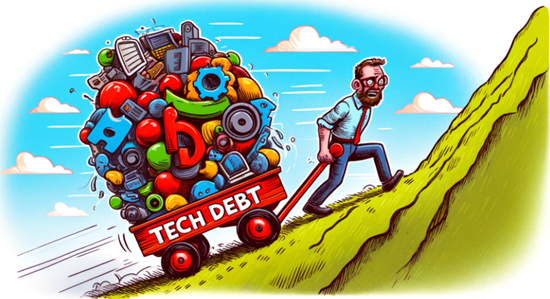Tech Debt Simplified
If you’re thinking about investing in a tech startup, either as an angel investor or venture capitalist, you need to know about something called technical debt. It’s a crucial factor that can greatly influence the success of a startup. Here’s a simple guide to understanding what technical debt is, why it matters, and what to look for when investing in a startup.
What is technical debt?
Imagine when a company is building software, and they decide to take some shortcuts to get their product to the market faster. These shortcuts might include not fully fixing bugs, skipping updates on certain features, or delaying improvements on the performance of the software. This creates a kind of “debt” that the company will need to “pay back” later by going back and addressing these issues. This is what we call technical debt.
Why is it important to understand technical debt?
Technical debt is like a double-edged sword. On one side, it can help a startup launch their product quicker than their competitors, keeping them relevant in a fast-paced industry. On the other side, too much technical debt can slow down a company’s progress because they have to spend extra time fixing issues they skipped before. This can hinder their ability to grow and improve.
How to assess technical debt when considering an investment?
When you’re looking at investing in a startup, consider these questions about their technical debt:
- What is the extent of the technical debt? You need to know how many issues are waiting to be fixed and how serious they are.
- How is the technical debt being managed? Is the company actively addressing their technical debt, or are they ignoring it? Understanding their approach can give you insight into their long-term viability.
- What is the plan for addressing the technical debt? It’s important to know if they have a solid plan to fix these issues and prevent new ones from occurring.
Understanding these aspects can help you evaluate the potential risks and rewards of investing in the startup.
The Positives of Technical Debt
Interestingly, technical debt isn’t always a bad thing. In the early stages of a startup, accumulating some technical debt can actually be beneficial. It allows a company to push out their product faster and start learning from how customers use it, which is vital for quick iterations and improvements. This can be critical for staying ahead in competitive markets. Additionally, the experience of managing technical debt can help a team prioritize effectively and optimize their workflows, making them more efficient in the long run. However, it’s important that the company has a plan to manage this debt, or it could overwhelm them later.
In conclusion, while technical debt comes with its risks, it can also serve as a catalyst for growth and agility in a startup. When evaluating a tech investment, a clear understanding and strategic management of technical debt can be a significant factor in the startup’s success.
Protovate can help you evaluate the company you’re investing it and determine it’s technical debt. Feel free to contact us.
Protovate pioneers new software, new systems, and new ways of working to bring your concept to life. Our hybrid-shore software development outsourcing model gives you access to the ideal talent to make it happen.










